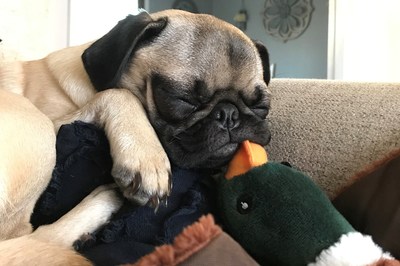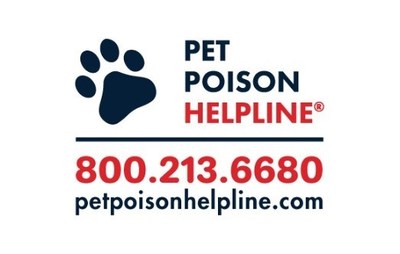|
23.05.2022 16:10:00
|
Winnie the Pug's Unlucky Penny
Change-Swallowing Pooch Treated for Deadly Zinc Poisoning
MINNEAPOLIS, May 23, 2022 /PRNewswire/ -- Every dog lover knows that pets swallow items they shouldn't, so when Alicia Thunder's playful pug Winnie vomited several coins, she wasn't that concerned.
"It was critical that she get to surgery as soon as possible due to potential zinc poisoning," said Dr. Renee Schmid."Dogs eat all sorts of things. When we found that Winnie had thrown up a few quarters and nickels I didn't think it was that big of a deal," said Thunder. "Next, there were two pennies and a nickel. When she started bringing up bile two days in a row, we decided to take her to the hospital." Winnie had been vomiting for almost a week at that point.
A radiograph performed at the first hospital showed that there was a clump of coins still in Winnie's stomach. Unfortunately, that hospital and the next hospital she visited did not have an available surgeon, so Thunder ultimately admitted her at the PAW Health Network in Kronenwetter, Wis. Pennies minted after 1982 contain zinc, which is highly toxic when ingested. The main clinical signs with zinc poisoning in dogs and cats are severe gastrointestinal distress with possible ulceration and hemolysis (destruction of red blood cells). Additional signs can include cardiac changes, pancreatitis, possible kidney failure and liver damage.
"Once they confirmed that Winnie still had coins in her stomach, including pennies which contain zinc, it was critical that she get to surgery as soon as possible due to potential zinc poisoning," said Dr. Renee Schmid, a senior veterinary toxicologist at Pet Poison Helpline. "Winnie had clinical signs consistent with zinc poisoning including anemia due to hemolysis, pancreatitis and severe GI distress. One of our most critical recommendations was to surgically remove the coins instead of recommending chelation, as chelation increases zinc absorption if the zinc-containing object is still present in the stomach or intestinal tract. Once the coins are removed zinc levels decrease quickly and chelation is usually not necessary." Chelation is a process that uses a drug that seeks out and binds to certain metals in the bloodstream, creating a compound that is excreted in urine. Due to hemolysis, Winnie was severely anemic and required a transfusion of packed red blood cells to stabilize her enough for surgery.
"They actually had to do two surgeries on Winnie," explained Thunder. "When they finished the first surgery to remove the coins, they did another X-ray, which showed she still had something in her system. When they went back in, they found that acid had eroded one of the pennies and they had to scrape it out."
"As we suspected, Winnie's condition began to stabilize and improve following surgery," added Dr. Schmid. "Winnie's post-surgical care included intravenous fluids, analgesics, antibiotics and medication to help control her vomiting and nausea." Fortunately, her anemia had improved by the next day and her other clinical signs continued to improve over the next several days.
"She had to spend two nights in the hospital," added Thunder. "When she got home, she had to wear a cone, she wasn't allowed to jump, and she was prescribed a number of medications. The good news is she's back to her normal little self. We still have no idea where she found the coins. My dad rebuilds old cars, so we think she may have gone scrounging around and found some old coins in one of the cars that had something tasty spilled on them. Who knows?"
Winnie's penny was far from lucky. Since May 23, 2022, is National Lucky Penny Day, the toxicology experts at Pet Poison Helpline are warning pet owners about the dangers of zinc poisoning by sharing Winnie's harrowing story as May's Toxin Tails case of the month.
Pet Poison Helpline created Toxin Tails to educate the veterinary community and pet lovers on the many types of poisoning dangers facing pets, both in and out of the home. All the pets highlighted in Toxin Tails have been successfully treated for the poisoning and fully recovered.
About Pet Poison Helpline
Pet Poison Helpline, your trusted source for toxicology and pet health advice in times of potential emergency, is available 24 hours, seven days a week for pet owners and veterinary professionals who require assistance treating a potentially poisoned pet. We are an independent, nationally recognized animal poison control center triple licensed by the Boards of Veterinary Medicine, Medicine and Pharmacy providing unmatched professional leadership and expertise. Our veterinarians and board-certified toxicologists provide treatment advice for poisoning cases of all species, including dogs, cats, birds, small mammals, large animals and exotic species. Pet Poison Helpline's fee of $75 per incident includes follow-up consultations for the duration of the case. Based in Minneapolis, Pet Poison Helpline is available in North America by calling 800-213-6680. Additional information can be found online at www.petpoisonhelpline.com.
Contact: Dr. Renee Schmid
Pet Poison Helpline
(952) 806-3803
RSchmid@petpoisonhelpline.com
![]() View original content to download multimedia:https://www.prnewswire.com/news-releases/winnie-the-pugs-unlucky-penny-301536553.html
View original content to download multimedia:https://www.prnewswire.com/news-releases/winnie-the-pugs-unlucky-penny-301536553.html
SOURCE Pet Poison Helpline
 Der finanzen.at Ratgeber für Aktien!
Der finanzen.at Ratgeber für Aktien!
Wenn Sie mehr über das Thema Aktien erfahren wollen, finden Sie in unserem Ratgeber viele interessante Artikel dazu!
Jetzt informieren!

